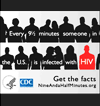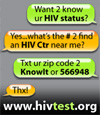National Women and Girls HIV/AIDS Awareness Day
Transcript
This podcast is presented by the Centers for Disease Control and Prevention. CDC—safer, healthier people.
March 10 is National Women and Girls HIV/AIDS Awareness Day—a day to raise awareness of the increasing impact of HIV/AIDS on women and girls and to encourage women and girls to take action and get tested for HIV.
In 2006, nearly 15,000 or more than a quarter of new HIV cases in the United States were among women and girls ages 13 years and older. Women of color are especially impacted by the disease.
HIV/AIDS is the leading cause of death for African American women aged 25 to 34. The estimated rate of new HIV cases for black women is nearly 15 times that of white women and nearly four times that of Hispanic women.
CDC currently estimates that approximately one in five people living with HIV in the United States is unaware of his or her HIV infection. This can lead to unknowingly transmitting the virus to others. So the first step to protecting yourself and others is to get tested for HIV. Prompt and early diagnosis of HIV is critical. If you have HIV, you can fully benefit from life-saving treatments and take action to prevent the spread of the virus. If you’re pregnant, it’s especially important that you get tested early. Pregnant women with HIV can take steps to prevent the spread of HIV to their babies, which can ultimately reduce the risk of their children being infected with HIV to less than two percent.
If you don’t have HIV, you can continue to stay HIV free by taking actions to protect yourself and your family. Make National Women and Girls HIV/AIDS Awareness Day a day to get the facts about HIV—to learn if you’re at risk, how HIV is spread, and how to protect yourself and your loved ones. If you're a parent, talk with your kids about HIV.
If you’ve never had an HIV test, or if your last HIV test was some time ago, please get yourself tested again. To find an HIV testing location near you, go to www.hivtest.org OR text your zip code to KNOW IT, that’s k-n-o-w-i-t.
For the most accurate health information, visit www.cdc.gov or call 1-800-CDC-INFO, 24/7.




